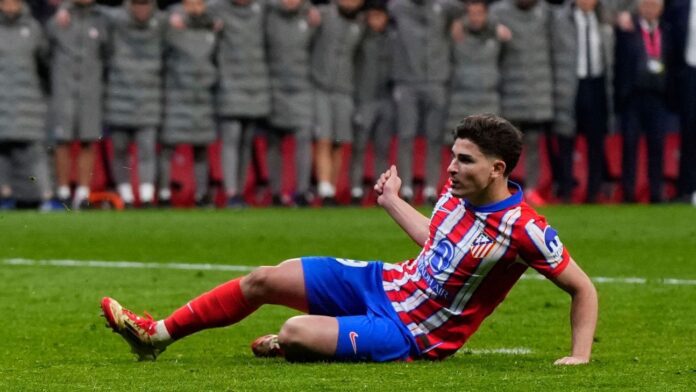ZURICH –The laws on taking a penalty kick were clarified Tuesday after Julián Álvarez‘s accidental double touch helped to eliminate Atlético Madrid from the Champions League.
The new interpretation will take effect in UEFA-organized games Wednesday when Germany plays Portugal in a Nations League semifinal in Munich, the European soccer body said.
The update published by FIFA-backed rules panel IFAB means the kind of penalty Átletico forward Álvarez had disallowed after scoring in a shootout against Real Madrid in March should now be retaken.
Álvarez slipped and kicked the ball against his standing left foot in the shootout in the Champions League round of 16.
After the looping ball beat Madrid goalkeeper Thibaut Courtois for an apparent score, the goal was ruled out by a video review and Atletico ultimately lost the shootout.
The laws of soccer relating to the penalty kick and penalty shootout were seen as correctly applied in Madrid though too vaguely worded. The incident was widely judged to have been unfair as Álvarez did not deliberately slip and take the double touch to gain an advantage.
“This situation is rare, and as it is not directly covered in Law 14, referees have understandably tended to penalize the kicker,” IFAB said in a statement. “However, this part of Law 14 is primarily intended for situations where the penalty taker deliberately touches the ball a second time before it has touched another player.”
IFAB clarified in a circular letter to soccer stakeholders that a penalty kick which is scored now after an accidental double touch should be retaken.
A double-touch penalty that is not scored will not be retaken. In a shootout, such a penalty “is recorded as missed,” IFAB said, and during regulation time or extra time a free kick can be awarded to the defending team.
The clarified rule also will apply at the Club World Cup which starts on June 14 in the United States. The 32-team lineup includes Atletico.
IFAB is comprised of FIFA plus the four British soccer federations. Rules can be changed with six of the eight votes which are distributed by four to FIFA and one each to the British.

















